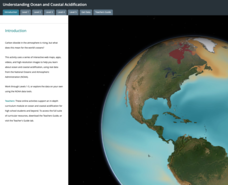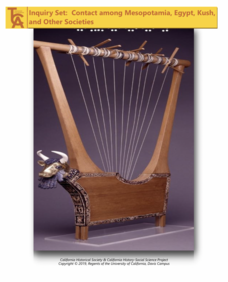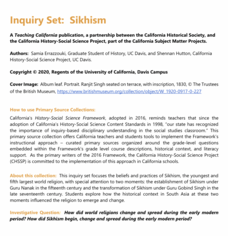University of California
Decolonization
The ripple effect from one small event can impact many others. Young historians research the ripple effect World War II had on decolonization in the second installment of an eight-part series. Through primary and secondary documents as...
University of California
Principles vs. Practices
Have you ever wondered what your own World Order would look like? Scholars use primary and secondary documents as well as video clips to investigate and analyze the Cold War. Using the sources, the principles and practices of nations...
NOAA
Ocean Acidification
Carbon dioxide is on the rise; does that also mean a rise in danger to humans and animals? Scholars learn what that means for the environment and more specifically the ocean. They examine data on the pH of different ocean areas and learn...
ESRI
Juneteenth: An American History through Maps
An interactive website traces the history of Juneteenth celebrations from their origin in Galveston, Texas, on June 19th to the present day. Using interactive maps, learners can find information about the African-American population...
PBS
Decoding Media Bias
Alternative facts? After watching the We The Voters film, "MediOcracy," viewers compare how cable news outlets CNN, Fox News, and MSNBC report the same story about politics or public policy. After a whole-class discussion of their...
University of California
Contact among Mesopotamia, Egypt, Kush, and Other Societies
Trade has always been a global affair. Explore what global trade meant for ancient Mesopotamians, Egyptians, and Kushites using a collection of documents from the historic societies. By examining literary works such as the Epic of...
University of California
Hellenistic Culture
It doesn't take long to change the world! Alexander the Great's reign may have been short-lived, but his vision for a multi-cultural Hellenistic world shaped Afroeurasia for centuries. Pupils examine documents, such as excerpts from...
University of California
Migration of Early Humans: Evidence and Interpretations
While much of prehistory is cloaked in mystery, ancient ancestors left evidence in DNA, languages, and materials from their time. Using photographs of items such as cave paintings and ancient tools, as well as maps of linguistic patterns...
University of California
Silk Roads
We take for granted globalization today, but its roots run deep within China centuries ago. Using texts from ancient Chinese historians and photographs of items showing growing Eurasian trade, scholars look at the traces of...
University of California
Religious Influences
While the Roman empire often conjures up images of soldiers and emperors, its culture was more complex. Using primary sources, including ancient historians and pictures of artifacts, pupils consider the religious influences on Roman...
University of California
Bread and Circuses: Rome as a Site of Encounter
An intriguing lesson uses 12 Roman artifacts to explain Roman society and politics. Young historians view images of artifacts and learn how each one represents an aspect of Roman society. Academics also complete a hands-on activity to...
University of California
Interactions in Baghdad and the Abbasid Caliphate
An interesting resource focuses on the cultures of different peoples that have lived in Baghdad and their interactions. Academics view 11 sources to understand how Baghdad has been home to people of many faiths and cultures throughout...
University of California
Influences from South to Southeast Asia
In ancient times, people along trade routes exchanged ideas in addition to goods. Scholars view eight primary sources, such as artwork, to understand how India influenced southern Asia. Academics participate in a short group discussion...
University of California
The Mongol Empire
Scholars review eight sources to learn about the impact of the Mongol Empire and their leaders, such as Genghis Khan. Academics learn how the Mongols destroyed states but also increased connections with the rest of the world. To finish,...
University of California
Was Slavery Always Racial?
The lesson focuses on slavery in the ancient world and asks academics to decide if it was always about race. Scholars view primary sources, participate in a short discussion, and complete a worksheet to understand how slavery in the...
University of California
Sikhism
How does a new religion start? The informative resource highlights the Sikhism religion. Academics learn how the religion was created and spread throughout the ancient world. Scholars view a series of primary sources and complete a...
University of California
The Virgin of Guadalupe
A worldly resource focuses on the transfer of goods, ideas, and religion that took place as part of the Columbian exchange. Academics view sources such as text and artwork to help them complete a worksheet.
University of California
Tenochtitlán
Behold, the Great Aztec empire! Scholars use primary sources to understand the impact of the Aztec city Tenochtitlan. Academics complete a worksheet and participate in group discussion to understand how Tenochtitlan was a melting pot for...
University of California
Jewish Holidays
Modern Jewish holidays have ancient roots with many connections to today. Using photographs of primary sources, such as fragments of a shofar, as well as texts, such as the Hebrew Tanakh, learners explore how Jewish holidays reflect...
Scholastic
Stressed Out?
Provide tweens and teens with information they need to know about stress with an article that details how stress affects various organs in the body. The article also offers tips for healthy ways to cope with stress.
Internal Revenue Service
Understanding the IRS: The IRS Yesterday and Today
Pupils explain why the Internal Revenue Service was instituted, how it functions, how it has changed over the years, and the ways it helps taxpayers today.
Scholastic
Stress and Drug Abuse
Young scholars identify the different causes of stress. In this health science lesson plan, learners find the connection between stress and drug abuse. They discuss about the different kinds of stress they experience everyday.
Science 4 Inquiry
Musical Vibes with Palm Pipes
Ancient people used musical pipes as early as the third millennium BCE. Young scientists explore the workings of musical pipes to better understand the relationship with frequency, length of pipe, and sound waves. They determine the...
Science 4 Inquiry
Rocks Makin' Rocks: Rock Cycle Simulation
Scholars review prior knowledge before completing a hands-on simulation of the rock cycle. They write stories or songs summarizing their simulations to demonstrate mastery.

























